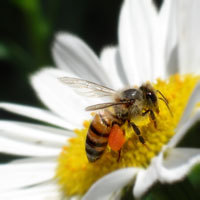
| Bayer Busting Bees Again | 22 October 14 |

Flupyradifurone can enter the environment through a number of different insecticide applications covering a large number of 'pests' in a variety of crops. It can also enter groundwater and the aquatic environment through surface run-off. Flupyradifurone can be applied as a plant spray, as a soil drench and as a seed treatment, and can persist in the environment through "carry-over" from one growing season to the next. Ottawa has moved to approve the new Bayer insecticide even with Health Canada's Pest Management Regulatory Agency (PMRA) issuing a warning about the risks of introducing it into the environment. "Flupyradifurone may pose a risk to bees, non-target beneficial arthropods, and freshwater and saltwater invertebrates when used for foliar application. Flupyradifurone may pose a risk to birds and small wild mammals when used for soybean seed treatment." Studies have proven that long term exposure to neurotoxins like neonicotinids impair bees' ability to find their hives and changes the pollen collecting behaviours of honey bees – leading to colony collapse.
View October 10, 2014 Sierra Club Canada article |
|
 Print version Print version |
Top |
